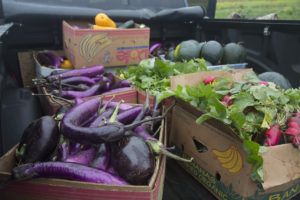 BY AUTUMN CHMIELEWSKI, MHA, MA
BY AUTUMN CHMIELEWSKI, MHA, MA
Good nutrition is a critical part of overall health. The food we eat provides the fuel for our minds and bodies affecting how we think and feel. The importance of good nutrition is highlighted in March through the recognition of National Nutrition Month. This month-long observance has been celebrated since the early 1980s as a way to encourage people to make informed food choices and develop sound eating and activity habits.
While blogs and education resources about nutrition and healthy food choices abound, access to healthy foods continues to be a struggle for many.
According to Hunger Solutions Minnesota, one in 10 households in the state struggle with food insecurity. This means they lack consistent access to enough food needed to live an active, healthy life. To put that in perspective, if every individual in Minnesota who was struggling with food insecurity lived in one place, it would nearly replace the populations of both Minneapolis and St. Paul.
This is a sizable problem with real health and environmental consequences.
One local organization working to reduce this problem is Twin Cities Food Justice (TCFJ). TCFJ is a nonprofit working to reduce food waste and hunger in the Twin Cities by being a link between those willing to help and those in need. The volunteer-led organization picks up fresh produce and bread that would otherwise be wasted and brings it to hunger-relief organizations that can distribute it to individuals and families in need.
In 2016, TCFJ volunteers rescued nearly 12,000 pounds of food. That number grew over 300% to nearly 40,000 pounds of food rescued in 2018, and it shows no signs of slowing. Strong partnerships with South Minneapolis organizations such as Seward Co-op, the Kingfield and Nokomis Farmers Markets, AIOIC, Augsburg Campus, Brian Coyle Community Center, Community Emergency Service, Division of Indian Work, and the Aliveness Project have helped fuel this growth.
While other larger food rescue organizations exist in the Twin Cities, TCFJ is one of the few that is willing to work with smaller donors. Food rescues at local co-ops and bakeries can be as small as 15 pounds one week and then swell to over 250 pounds the next week. These food donations are immediately delivered to local food shelves, community kitchens and other organizations that provide the food to people in need.
With an eye toward sustainability, TCFJ intentionally works to coordinate food rescue routes so that volunteers are delivering food at locations in close physical proximity to the donor sites. For example, fresh produce rescued from Seward Co-op’s Friendship store on 38th Street is delivered to The Aliveness Project less than a half mile away every week. Several volunteers also choose to deliver the rescued food by bike, hauling the donations with TCFJ’s bike trailer.
TCFJ’s work reducing food waste saves more than just food. The health and environmental benefits of reducing food waste are profound. Research shows that healthy diets reduce morbidity and mortality, which lowers medical care costs, increases productivity and improves quality of life. And taking food waste out of the waste stream reduces methane gases created by food in landfills.
The importance of this type of work was even recently acknowledged in Minnesota Governor Tim Walz’s proposed state budget, which included a proposed $1.5 million biennial General Fund ongoing appropriation to help reduce the amount of food waste going to landfills.
As TCFJ continues to grow, additional partners and support are welcome. Any organization interested in donating or receiving fresh produce or bread can complete a simple online application at https://www.tcfoodjustice.org/partner-with-us. Volunteers interested in helping with food rescues are also needed and can complete an online application at https://www.tcfoodjustice.org/volunteer.
Food Facts by the Numbers:
*40% – Percent of food produced in America that never gets eaten, according to the National Resource Defense Council
*$165 Billion – Value of the food that Americans throw away each year
*20 – Pounds of food thrown away by each American every month
*131,950 – Number of food insecure individuals in Hennepin County, according to Feeding America
*117 Million – Number of American adults who have one or more preventable chronic diseases, many of which are related to poor quality eating patterns and physical inactivity, according to the U.S. Department of Health and Human Services.
Autumn is the current co-executive director of Twin Cities Food Justice. This is a VOLUNTEER role and no compensation is received.
Photo by Selena Salfen (selenasalfen.com)






















